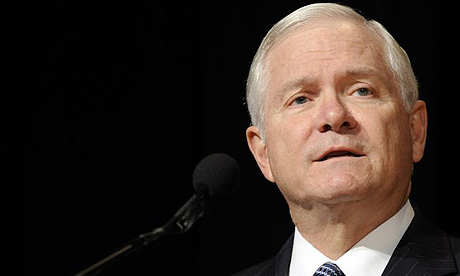Obama administration accused Europe's leaders of endangering peace because of reluctance to foot bill for adequate defence Robert Gates, US defence secretary. The US has told Nato that 'pacification' of Europe is endangering security. Photograph: Susan Walsh/AP The Obama administration accused Europe's leaders of endangering peace today because of their growing pacifism and reluctance to foot the bill for adequate defence. In a withering attack on what Washington sees as European complacency in the face of new security threats, Robert Gates, the US defence secretary, demanded root-and-branch reform of the transatlantic alliance, voiced exasperation with Nato bureaucracy and said it was becoming increasingly difficult for the US and Europe "to operate and fight together". Gates told a Washington meeting of Nato officials and security experts "the pacification of Europe" had gone too far. "The demilitarisation of Europe, where large swaths of the general public and political class are averse to military force and the risks that go with it, has gone from a blessing in the 20th century to an impediment to achieving real security and lasting peace in the 21st," he said. "Not only can real or perceived weakness be a temptation to miscalculation and aggression, but … the resulting funding and capability shortfalls make it difficult to operate and fight together to confront shared threats." The US secretary of state, Hillary Clinton, joined in what was a concerted warning to the Europeans, calling for an "honest discussion" of European defence spending and complaining that the alliance was at risk of turning into a talking shop. Gates's criticism came days after the Dutch government collapsed over a dispute about Afghanistan and announced it would start withdrawing some 2,000 troops from August. The pull-out has spurred worries that other Europeans could follow suit. Away from the immediate priorities of the Afghan war, Gates indicated that the Nato and European predicaments were "part of a larger cultural and political trend affecting the alliance … [which] faces very serious, long-term, systemic problems". While the Obama administration has just asked Congress for a defence budget of more than $700bn (£454bn) – almost 5% of GDP – for next year, Gates complained that only four of the 26 Nato allies in Europe spent more than 2% of GDP on defence. A recent meeting of Nato ministers in Istanbul heard that the alliance had a €640m (£561m) hole in its budget for this year. Gates voiced impatience with years of unredeemed European pledges to procure more cargo aircraft and helicopters. "Their absence is directly impacting operations in Afghanistan ... Nato needs serious, far-reaching, and immediate reforms to address a crisis that has been years in the making," he said. The 28 Nato countries are embroiled in an attempt to come up with a new mission statement, and there are divisions both transatlantic and within Europe over the wording. The warnings from Washington appeared to be an attempt to dictate the key components of the new doctrine.'Pacification' of Europe is threat to security, US tells Nato

Thursday, 25 February 2010
Posted by
Britannia Radio
at
00:32
![]()





















